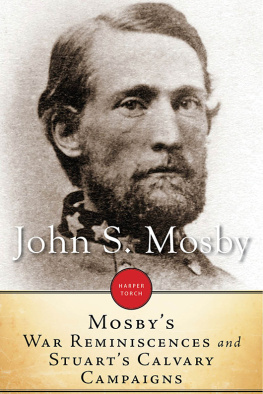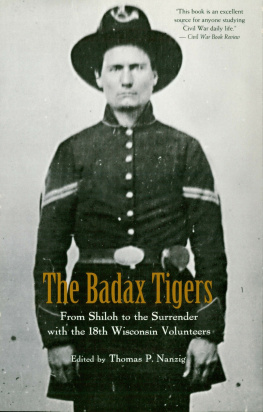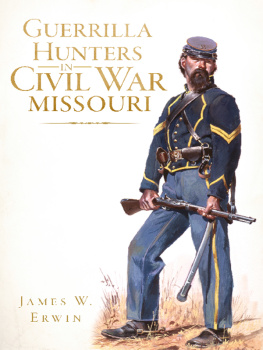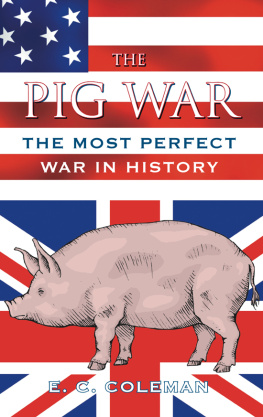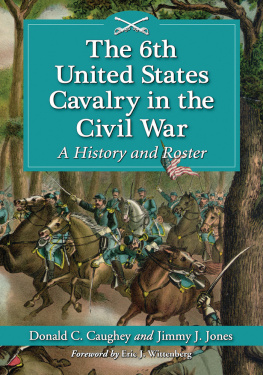PREFACE
I have for a long time intended the publication of this book, for I thought that such a work would not only be found interesting to the public, but would do justice to the brave men with whom it was my fortune to be associated during the dark hours of the rebellion. To serve them is and ever will be my greatest pleasure.
The remarkable features and events of our late Cavalry movements in Virginia and elsewhere, visible to me during the campaigns of the Army of the Potomac, were noted daily in my journal. From that diary this story of our raids, expeditions, and fights is compiled.
My descriptions of battles and skirmishes, in some cases, may seem too brief and unsatisfactory; to which I can only say that scores of engagements, which to the participants appear to be of vast importance, have very little general interest. On the other hand, however, it is to be regretted that where our gallant horsemen have done the most brilliant things, it has been impossible for me, in many instances, to secure reliable and detailed accounts with which to do them full justice.
Willard Glazier.
New York , October 8th, 1870.
CHAPTER I
THE WAR FOR THE UNION CONTEST BEGUN
1861. Enthusiasm of the North. Washington Threatened. Bull Run, and Its Lessons. General Scott and the Cavalry. Enlistment under Captain Buel. Harris Light Cavalry. Leaving Troy, New York. Captain A. N. Duffi. Drilling and Fencing at Scarsdale, New York. Bound for the Seat of War. Philadelphia. Baltimore. Washington. Camp Oregon.
The eleventh of April, 1861, revealed the real intention of the Southern people in their dastardly assault upon Fort Sumter. The thunder of Rebel cannon shook the air not only around Charleston, but sent its thrilling vibrations to the remotest sections of the country, and was the precursor of a storm whose wrath no one anticipated. This shock of arms was like a fire-alarm in our great cities, and the North arose in its might with a grand unanimity which the South did not expect. The spirit and principle of Rebellion were so uncaused and unprovoked, that scarcely could any one be found at home or abroad to justify them.
President Lincoln thereupon issued a call for seventy-five thousand men to uphold and vindicate the authority of the Government, and to prove, if possible, that secession was not only a heresy in doctrine, but an impracticability in the American Republic. The response to this call was much more general than the most sanguine had any reason to look for. The enthusiasm of the people was quite unbounded. Individuals encouraged individuals; families aroused families; communities vied with communities, and States strove with States. Who could be the first and do the most, was the noble contention which everywhere prevailed. All political party lines seemed to be obliterated. Under this renovating and inspiring spirit the work of raising the nucleus of the grandest army that ever swept a continent went bravely on. Regiments were rapidly organized and as rapidly as possible sent forward to the seat of Government; and so vast was the number that presented themselves for their country's defence, that the original call was soon more than filled, and the authorities found themselves unable to accept many organizations which were eager to press into the fray.
Meanwhile the great leaders of the Rebellion were marshalling the hordes of treason, and assembling them on the plains of Manassas, with the undoubted intention of moving upon the national capital. This point determined the principal theatre of the opening contest, and around it on every side, and particularly southward, was to be the aceldama of America, the dreadful "field of blood."
The first great impulse of the authorities was in the direction of self-defence (and what could be more natural and proper?), and Washington was fortified and garrisoned. This done, it was believed that the accumulating forces of the Union, which had become thoroughly equipped and somewhat disciplined, ought to advance into the revolted territory, scatter the defiant hosts of the enemy, and put a speedy end to the slaveholders' Rebellion. But the hesitation and indecision which prevailed in our military circles were becoming oppressive and unendurable, and hence the cry of "On to Richmond!" was heard from the Border States to the St. Lawrence, precipitating the first general engagement of the war. Our defeat at Bull Run was a totally unexpected disaster, which, for a time, it was feared, would chill the enthusiasm and greatly weaken the energy of the North. But though the South was much strengthened and emboldened by their victory, our defeat had its own curative elements: it taught us that the enemy was determined and powerful, and that to overcome him the ranks of the Union army must be filled with something besides three months' men, or men on any very limited term of enlistment. Other lessons were also gained: our men had formed some acquaintance with the citizens and the country; they had learned the importance of a more thorough discipline and organization; and those who had gone forth as to a picnic or a holiday, sat down "to count the cost" of "enduring hardness as good soldiers." The nation discovered that this struggle for life was desperate and even dubious, and it was thoroughly aroused.
Under the military rgime of General Winfield Scott, the cavalry-arm of the service had been almost entirely overlooked. His previous campaigns in Mexico, which consisted mainly of the investments of walled cities, and of assaults on fortresses, had not been favorable to extensive cavalry operations, and he was not disposed at so advanced an age in life materially to change his tactics of war. What few regiments of cavalry we had in the regular army were mostly broken up into small detachments for the purpose of ranging our Western frontiers, while a few squads were patrolling between the outposts of our new army, carrying messages from camp to camp, and pompously escorting the commanding generals in their grand reviews and parades.
But the Black Horse Cavalry of Virginia, at Bull Run, unmatched by any similar force on our side, had demonstrated the efficiency and importance of this branch of the service, and our authorities began to change their views. The sentiment of the people at large seemed to turn in the same channel, and a peculiar enthusiasm in this direction was perceptible everywhere. It was as though the spirit of the old knight-errantry had suddenly fallen upon us.
I was in Troy, New York, when the sad intelligence of the reverse to our arms at Bull Run, was received. This was followed quickly by another call for volunteers, and I decided without hesitation to enter the army. In accordance with my resolve I enlisted as a private soldier at Troy, on the sixth day of August, 1861, in a company raised by Captain Clarence Buel, for the cavalry service. To encounter the chivalrous Black Horse Cavalry, of Bull Run fame, it was proposed to raise a force in the North, and as Senator Ira Harris, of New York, was giving this organization his patronage and influence, a brigade was formed, whose banners should bear his name.






